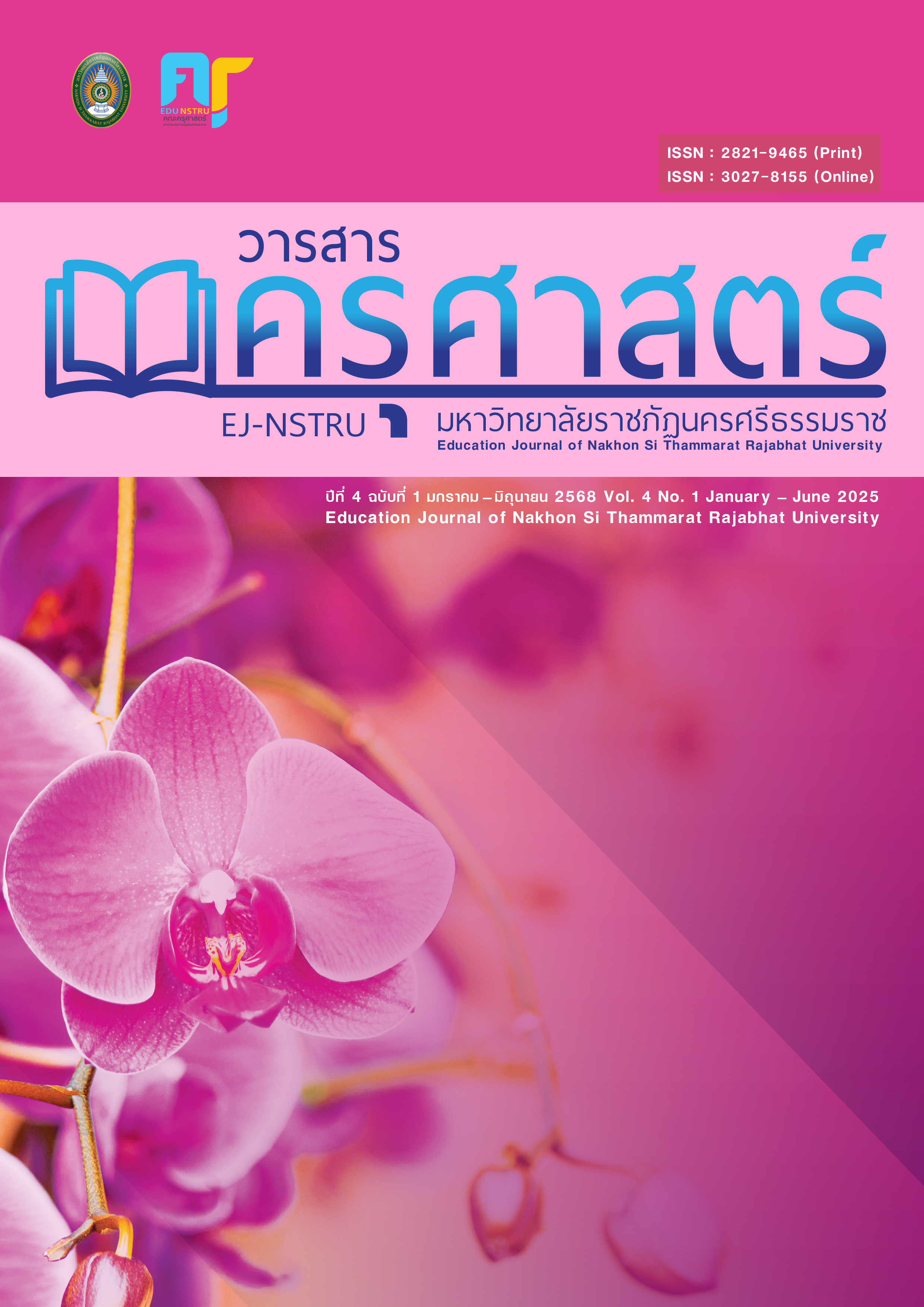Socratic Questioning Learning for Promoting Active Citizen Base on Sustainable Economics
Main Article Content
Abstract
Active citizen base on sustainable economics is an individual who can fully perform their duties and take responsibility for the environmental impacts of their actions. They exercise their rights in ways that benefit the public, both in terms of education related to nature and the environment, as well as in providing critiques to protect natural resources, which directly affect the livelihoods dependent on them. Additionally, these citizens use economic principles as key mechanisms to explain social phenomena, seeking solutions that align with the specific social context. The learning process aimed at promoting sustainably economically aware citizenship consists of: 1) Engagement, 2) Exploration, 3) Explanation, and 4) Elaboration & Evaluation, Socratic questioning helps build environmental citizenship by encouraging learners to develop ethical awareness, critical thinking, decision-making, and creative dialogue skills, which are essential qualities for addressing today’s environmental issues. This learning process is designed to incorporate Socratic questioning at every step, encouraging learners to think critically, examine their understanding, and pose questions about complex issues. Furthermore, it promotes open and in-depth discussions that lead to a deeper analysis of economic decision-making and its environmental impact. Learners are provided opportunities to develop diverse perspectives and find sustainable solutions through reasoned inquiry and responses that anticipate empirical outcomes.
Article Details

This work is licensed under a Creative Commons Attribution-NonCommercial-NoDerivatives 4.0 International License.
บทความที่ได้รับการตีพิมพ์เป็นลิขสิทธิ์ของวารสารครุศาตร์ มหาวิทยาลัยราชภัฏนครศรีธรราช
ข้อความที่ปรากฏในบทความแต่ละเรื่องในวารสารวิชาการเล่มนี้เป็นความคิดเห็นส่วนตัวของผู้เขียนแต่ละท่านไม่เกี่ยวข้องกับวารสารครุศาสตร์ มหาวิทยาลัยราชภัฏนครศรีธรรมราช
References
Abdullah, N. Niazi, J., Idris, G., & Norul Hidayah, B.M. (2022). Socratic Questioning: A Philosophical Approach in Developing Critical Thinking Skills. Al Hikmah International Journal of Islamic Studies and Human Sciences, 5(4), 143-161. https://doi.org/10.46722/hikmah.v5i4g
ALU Site Admin. (2020, February 10). Understanding the Socratic Method of Teaching. Abraham Lincoln University. https://www.alu.edu/alublog/understanding-the-socratic-method-of-teaching/
Barry, J. (2005). Resistance is fertile: From environmental to sustainability citizenship. ResearchGate. https://www.researchgate.net/publication/253186425_Resistance_Is_Fertile_From_Environmental_to_Sustainability_Citizenship
Zach, C. (2014, April 29). The Fragility of the Socratic Method. Medium. https://medium.com/@zachcaceres/the-fragility-of-the-socratic-method-3d57d0a19a0a
Charoenmuang, T. (2017). Citizens and Democratic Society. Kobfai Publishing Project. (in Thai)
Chetpayark, K. (2017, May 17). “Democracy classroom is not only about civic duties” Talk with Asst. Prof. Atthaphon Anantaworasakul. The Matter. https://thematter.co/social/active-citizen/24144 (in Thai)
Dobson, A. (2007). Environmental citizenship: Towards sustainable development. Sustainable Development, 15(5), 276–285. https://doi.org/10.1002/sd.344
European Cooperation in Science and Technology. (2022, June 5). What does it mean to be an environmental citizen?. COST. https://www.cost.eu/environmental-citizenship/
Facione, P. A. (2015). Critical Thinking: What It Is and Why It Counts. Insight Assessment.
Hadjichambis, A., C. & Hadjichambi, D., P. (2020). Education for Environmental Citizenship: The Pedagogical Approach. In Mueller, M., P. & Tippins, D., J. (Eds), Conceptualizing Environmental Citizenship for 21st Century Education. (pp.237-261). Springer Open.
Horne, R., Fien, J., Beza, B. B., & Nelson, A. (2016). Sustainability citizenship in cities: Theory andpractice. Routledge.
Jaffe, L. (2023, December 4). Advantages and Disadvantages of the Socratic Method of Teaching. Higher Learning Hub. https://higherlearninghub.com/advantages-and-disadvantages-of-the-socratic-method-of-teaching/
Littig, B. (2004). The Neo-Socratic Dialogue (NSD): a method of teaching the ethics of sustainable development. In Galea, C. (Ed.), Teaching business sustainability : vol. 1, from theory to practice. (pp. 240-252). Sheffield: Greenleaf Publ. https://nbn-resolving.org/urn:nbn:de:0168-ssoar-5415
Machin, A., & Tan, E. (2024). Green European citizenship? Rights, duties, virtues, practices and the European green deal. European Politics and Society, 25(1), 152–167. https://doi.org/10.1080/23745118.2022.2118984
Mangkhang, C. (2022). Intelligence in Teaching Social Studies. Lanna Printing. (in Thai)
National Strategy 2018-2037. (2018, October 13). Royal Gazette, Volume 135, Section 82. Pages 1-71. https://www.ratchakitcha.soc.go.th/DATA/PDF/2561/A/082/T_0001.PDF (in Thai)
Paul, R., & Elder, L. (2007). Critical Thinking: The Art of Socratic Questioning. Foundation for Critical Thinking. https://www.criticalthinking.org/files/SocraticQuestioning2006.pdf
Pedaste, M., Maeots, M., Siiman, L. A., De Jong, T., Van Riesen, S. A. N., Kamp, E. T., Manoli, C. C., Zacharia, Z. C., & Tsourlidaki, E. (2015). Phases of inquiry-based learning: Definitions and the inquiry cycle. Educational Research Review, 14, 47-61. https://doi.org/10.1016/j.edurev.2015.02.003
Sangwanglao, J. (2020). The application of economic literacy in the economics curriculum of Thai basic education. Journal of Education Naresuan University, 22(3), 324-336. Retrieved from https://so06.tci-thaijo.org/index.php/edujournal_nu/article/view/178450 (in Thai)
Sayer, A. (2010). Method in social science: A realist approach (2nd ed.). Routledge.
Seub Nakhasathien Foundation. (2024). Situation of forests and the environment in Thailand 2023. https://shorturl.asia/Xlo4m (in Thai)
Siripongnapat, V. (2023). The Enhancement of Active Citizenship for Learners through Socratic Questioning. Journal of Education Studies, 51(1), 1-13. https://doi.org/10.58837/CHULA.EDUCU.51.1.8 (in Thai)
Smith, G. (2005). Green citizenship and the social economy. Environmental Politics, 14(2), 273-289. https://doi.org/10.1080/09644010500055175
Sutton, J. (2020, Jun 19). Socratic Questioning in Psychology: Examples and Techniques. Positive Psychology. https://positivepsychology.com/socratic-questioning/
The 13th National Economic and Social Development Plan (2023-2027). (2022, November 1). Royal Gazette. Volume 139, Special Section 258. Pages 1-149. https://www.nesdc.go.th/ewt_news.php?nid=13651 (in Thai)
University of Mary Washington. (n.d.). Economic sustainability. https://sustainability.umw.edu/areas-of-sustainability/economic-sustainability/
Vygotsky, L. S. (1978). Mind in Society: The Development of Higher Psychological Processes. Harvard University Press.
Wang, Y. Y. (1996). Sustainable Economic Development. In Guitián, M. and Mundell, R.A. (Eds.), Inflation and Growth in China. (pp.123-133). International Monetary Fund.
Westheimer, J., & Kahne, J. (2004). What kind of citizen? The politics of educating for democracy. American Educational Research Journal, 41(2), 237–269. https://doi.org/10.3102/00028312041002237


